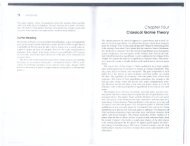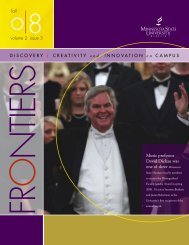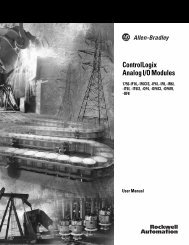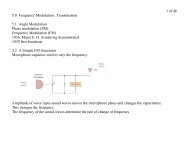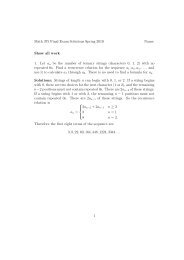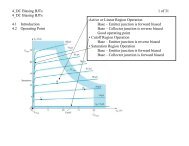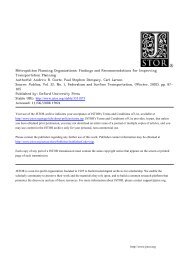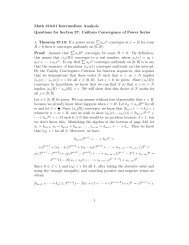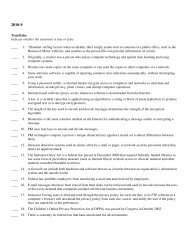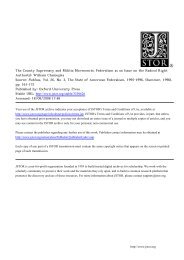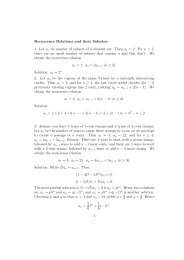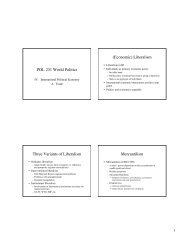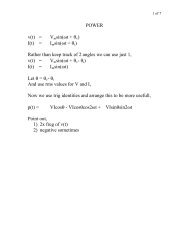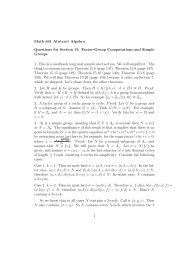Clemons and McBeth - MavDISK
Clemons and McBeth - MavDISK
Clemons and McBeth - MavDISK
Create successful ePaper yourself
Turn your PDF publications into a flip-book with our unique Google optimized e-Paper software.
CHAPTER 2<br />
THE RATIONAL PUBLIC POLICY METHOD<br />
Mini-Cases<br />
"McNamara's Retrospective: Rational Decision Making?"<br />
"The Small Town Health Clinic"<br />
ro underst<strong>and</strong> <strong>and</strong> evaluate the rational model of policy analysis, you need to underst<strong>and</strong> its<br />
~enesis, history, <strong>and</strong> evolution, including the critical reaction it spurred. After providing you<br />
.viththat base we explain the rational model <strong>and</strong> provide one case (Vietnam) where it is tradiionally<br />
blamed, perhaps erroneously, for producing poor policy. Next we offer another case<br />
:hatdemonstrates how the rational model can help policy analysis, <strong>and</strong> we discuss its relevance<br />
,n practice. We then provide you with the tools necessary to evaluate this <strong>and</strong> other models<br />
:>eforeconcluding the chapter.<br />
Genesis of the Rational Model<br />
The debates over the U.S. Constitution revolved around notions of decentralization versus<br />
:entralization <strong>and</strong> participation versus hierarchy. Alex<strong>and</strong>er Hamilton, who favored a strong<br />
~xecutive <strong>and</strong> decision making by experts, argued that democratic decision making could not<br />
)e made by emotional citizens. Instead, Hamilton envisioned a democracy in which an enjghtened<br />
few made policy in the best interests of the masses.<br />
Others such as Thomas Jefferson, although he was not in Philadelphia for the Convenjon,<br />
expressed the belief that democracy must be about decentralization <strong>and</strong> empowerment<br />
)f the people. In theory, the Constitution created a republican (representative) system of<br />
:hecks <strong>and</strong> balances <strong>and</strong> separation of powers that would allow for calm deliberation. In pracice,<br />
however, the initial reality was that Jefferson's view predominated.<br />
For at least the first hundred years, the United States was a country with a relatively small<br />
ederal government.' The political philosophy of the country was one of laissez.Caire<br />
'The Constitution was ratified in 1789. Fifty-two years later, in 1841, the total number of civilians working<br />
Jr the federal government was barely over 18,000. Fifty years later, in 1891. the total was still less than 160,000ut<br />
four years earlier (1887), Congress had created the Interstate Commerce Commission (ICC). the first regulalOry<br />
~ency. By 1990. the total number of civilian federal employees had peaked at more than 3.5 million. Today there<br />
'e under 3 million. Of course, it is also true that fewer than one-fifth of all govenunent employees work for the fed.<br />
'31government. By far, the largest percentage of employees. work at the ]ocallevel.<br />
CHAPTER2 . THE RATIONAL PUBUC POUCy METHOD<br />
economics, <strong>and</strong> the primary role of the government was to protect property <strong>and</strong> control interstate<br />
cornmerce <strong>and</strong> to control <strong>and</strong> protect U.S. interests in the realm of international trade. The<br />
states had the power to maintain the safety, health, welfare, <strong>and</strong> morals of the people under the<br />
Constitution.<br />
Unfortunately, or perhaps inevitably, Jefferson's view of a decentralized government<br />
educating citizens in the principles of civic virtue was not realized either. Instead, state <strong>and</strong><br />
local governments were plagued by patronage, corruption, <strong>and</strong> generally sloppy decisionmaking<br />
practices.<br />
At the federal level, government had been transformed by the rnid-1800s from a<br />
Government by Gentlemen to a system of patronage <strong>and</strong> frequent corruption. At the same<br />
time, after the Civil War, American society changed fundamentally from an insular agrarian<br />
country to an international <strong>and</strong> urbanized country. For the first time in its history, the country<br />
had to deal on a large scale with problems like crime, poverty, pollution, monopolization of<br />
industry, economic trade issues, <strong>and</strong> the growth of technology. These new problems generated<br />
the need for complex policy <strong>and</strong> competent civil servants.<br />
The assassination of President Garfield in July 1881 at Union Station in Washington, D.C.,<br />
by a disgruntled job seeker named Charles Julius Guiteau, helped spur Congress into creating<br />
a merit-based civil service by passing the Pendleton Act in 1883. This represented the first attempt<br />
to rationalize the bureaucracy <strong>and</strong> hence to rationalize government decision making. In<br />
accordance with Max Weber's dictum of the ideal bureaucracy, the federal bureaucracy was<br />
staffed (ideally) by neutral experts who would make decisions not under the influence of the<br />
irrationalities of politics but rather through rational, competent, businesslike <strong>and</strong> scientific<br />
methods of analysis.'<br />
WoodrowWilson published The Study of Administration (1887), making a complex<br />
argument that politics <strong>and</strong> administration should be separated, largely to protect the administrative<br />
sphere from partisanship, exploitation, <strong>and</strong> corruption. The separation of politics <strong>and</strong><br />
administration is known as the politics/administration dichotomy. Others followed Wilson's<br />
path. Goodnow (1900), more focused on this issue than Wilson, attempted to make clear the<br />
distinction between politics (legislation that follows the public will) <strong>and</strong> administration (the<br />
execution of that legislation by experts). Gulick (1937) argued that, over time, the decisions<br />
of government would become so complex that only expert bureaucracies could make<br />
informed <strong>and</strong> sound public policies.<br />
The Rational Public Policy Method<br />
The theories of scientific management-an idea most closely associated with the work of<br />
Frederick Winslow Taylor (1911 )-also influenced the interpretation of what the relationship<br />
should be between politics <strong>and</strong> administration.Taylor, who pioneered time <strong>and</strong> motion<br />
'It is generally acknowledged that Max Weber, a Gennan sociologist, developed the classic exposition of<br />
bureaucracies. Weber referred to his model as "ideal" but was not implying that it was ideal in the sense of being<br />
perfect. Rather. he was merely laying forth the hypothetically pure. or archetypal. fonn. <strong>Clemons</strong> thoroughly<br />
explains bureaucracy as a principle of organization, considers the power of bureaucracies. <strong>and</strong> discusses the relevance<br />
of bureaucracy to democracy in an essay in Freeman (1997, 175-90).<br />
39



